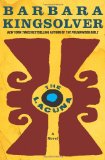Book Review: “The Lacuna” by Barbara Kingsolver
January 5, 2010
It’s been a number of years since Kingsolver’s last novel, “Prodigal Summer.” The sheer scale of “The Lacuna” makes you wonder if some things got pent up, that there was a far-flung net of author’s energies, tensions that had to be released, catastrophically, in one go.
I’ve read every one of Kingsolver’s novels. Her writing makes me feel at home, enough so that I blundered into The Lacuna with an ill-fated hubris that I’d feel just as at ease with it–not so. Reading this book, despite its breadth, quality and intriguing subject matter: a battle.
Perhaps it is the very protagonist’s sense of blank anonymity that led me to feeling so dragged down. It is difficult to root for Harrison Shepherd, neglected, brilliant son of a Mexican mother and a bureaucrat American father, because rooting for him is like rooting for air, for nothingness. The very element that is keyed to bring reflective brooding into the story: this poor guy, these adventures he’s having!–instead made me feel enervated.
The plot zooms along at a clattering fury. Shepherd now in dreadful military boarding school outside of Washington, now implausibly mixing plaster for Diego Rivera. Multiple critical turning points have a deus ex machina quality to them; it’s not just Rivera, but subsequent encounters with Trotsky, a right-place-right-time setting in the Bonus Day riots in DC, family fate influenced by Howard Hughes. To me it feels too bombastic, too many coincidences.
Once back in the states as a man, Shepherd faces a 200 page saga of extreme pathos in the face of rampant anti-communist agendas in mid-century Appalachia. It gets so unfair for Shepherd that each page is an endurance, more agonizing than the last.
Kingsolver’s supporting characters fare better. Violet Brown, Shepherd’s secretary, is luminescent. Frida Kahlo, though she has been done and done and done again in popular culture lately, has a believable intensity. Trotsky gets an interesting, sweet treatment.
The point here, not, fortunately, entirely lost in the novel’s frenetic changes of scenery, is of the spaces between. As Kahlo points out and Shepherd repeats: the most important thing about someone is the thing you don’t know. For us as readers: there’s a missing notebook in Shepherd’s otherwise complete personal history. We think, by the end, that we have probably figured out what was in that gap–that lacuna–but have we?
What it comes down to, though, is engagement. This book is very good. Its scope is so immense that it would have required near genius to rope into something cohesive. And yet, at the end, dangerously, I didn’t care that it was over. In fact, I was waiting for it to be over. Not being able to care for the main character, a character whose incompleteness represents the core theme of the novel itself, renders the experience impersonal.
One Comment
Get the Book!
Buy the books mentioned in this post from Amazon.com now and help me maintain my rock 'n roll lifestyle.
Related Posts
- Book Review: "Daughter of Fortune" by Isabel Allende
June 9, 2009 - Book Review: “Kaaterskill Falls” by Allegra Goodman
January 4, 2010 - Book Review: "The Three Musketeers" by Alexandre Dumas
July 8, 2009 - Book Review: Venetia Kelly’s Traveling Show by Frank Delaney
March 2, 2010 - Book Review: “Sense and Sensibility” by Jane Austen
March 11, 2010


Having just finished this, I have to say that I don’t agree with your opinion of Shepherd. I didn’t find him incomplete or empty. There was a definite character there.
As for the book, it took me a long time to get past the first 20 pages or so, but somewhere around 70 pgs in I found I was enjoying it. I would summarize it as “Forrest Gump does communism with some Kafka sprinkled in for good measure.”